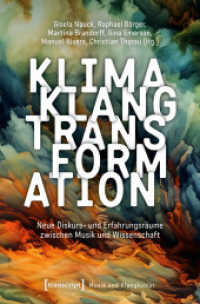- ホーム
- > 洋書
- > 英文書
- > Psychology
Full Description
What does Lacan show us? He shows us that desire is not a biological function; that it is not correlated with a natural object; and that its object is fantasized. Because of this, desire is extravagant. It cannot be grasped by those who might try to master it. It plays tricks on them. Yet if it is not recognized, it produces symptoms. In psychoanalysis, the goal is to interpret—that is, to read—the message regarding desire that is harbored within the symptom.
Although desire upsets us, it also inspires us to invent artifices that can serve us as a compass. An animal species has a single natural compass. Human beings, on the other hand, have multiple compasses: signifying montages and discourses. They tell you what to do: how to think, how to enjoy, and how to reproduce. Yet each person's fantasy remains irreducible to shared ideals.
Up until recently, all of our compasses, no matter how varied, pointed in the same direction: toward the Father. We considered the patriarch to be an anthropological invariant. His decline accelerated owing to increasing equality, the growth of capitalism, and the ever-greater domination of technology. We have reached the end of the Father Age.
Another discourse is in the process of taking the former's place. It champions innovation over tradition; networks over hierarchies; the draw of the future over the weight of the past; femininity over virility. Where there had previously been a fixed order, transformational flows constantly push back any and all limits.
Freud was a product of the Father Age. He did a great deal to save it. The Catholic Church finally realized this. Lacan followed the way paved by Freud, but it led him to posit that the father is a symptom. He demonstrates that here using Hamlet as an example.
What people have latched onto about Lacan's work—his formalization of the Oedipus complex and his emphasis on the Name-of-the-Father—was merely his point of departure. Seminar VI already revises this: the Oedipus complex is not the only solution to desire, it is merely a normalized form thereof; it is, moreover, a pathogenic form; it does not exhaustively explain desire's course. Hence the eulogy of perversion with which this seminar ends: Lacan views perversion here as a rebellion against the identifications that assure the maintenance of social routines.
This Seminar predicted "the revamping of formally established conformisms and even their explosion." We have reached that point. Lacan is talking about us.
Contents
Translator's Note
Abbreviations
INTRODUCTION
I. Constructing the Graph
II. Further Explanation
On Desire in Dreams
III. The Dream about the Dead Father: "He did not know he was dead"
IV. Little Anna's Dream
V. The Dream about the Dead Father: "As He Wished"
VI. Introducing the Object of Desire
VII. Desire's Phallic Mediation
A Dream Analyzed by Ella Sharpe
VIII. The Little Cough as a Message
IX. The Fantasy about the Barking Dog
X. The Image of the Inside-Out Glove
XI. Sacrificing the Taboo Queen
XII. The Laughter of the Immortal Gods
Seven Classes on Hamlet
XIII. Impossible Action
XIV. The Desire Trap
XV. The Mother's Desire
XVI. There is no Other of the Other
XVII. Ophelia, the Object
XVIII. Mourning and Desire
XIX. Phallophanies
The Dialectic of Desire
XX. The Fundamental Fantasy
XXI. In the Form of a Cut
XXII. Cut and Fantasy
XXIII. The Function of the Subjective Slit in Perverse Fantasies
XXIV. The Dialectic of Desire in Neurosis
XXV. The Either/Or Concerning the Object
XXVI. The Function of Splitting in Perversion
Conclusion and Overture
XXVII. Toward Sublimation
Appendices
Jacques-Alain Miller, Marginal Notes on the Seminar on Desire
Translator's Endnotes
Index








